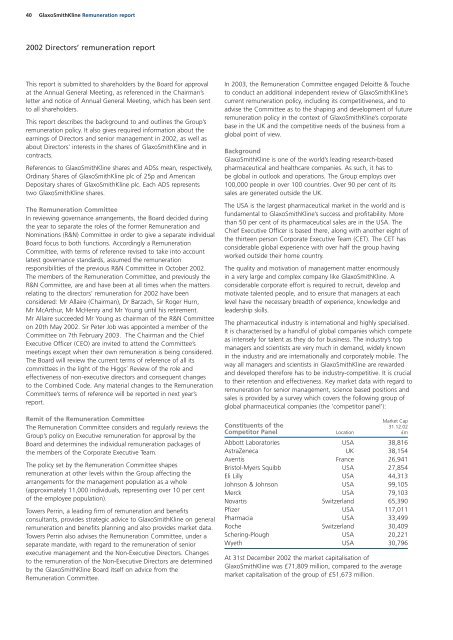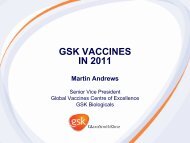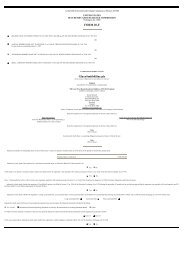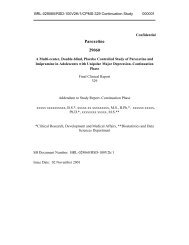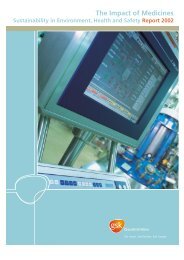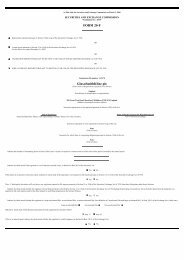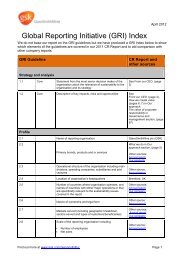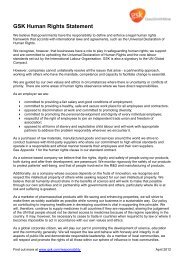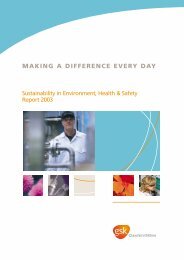GSK Annual Report 2002
GSK Annual Report 2002
GSK Annual Report 2002
Create successful ePaper yourself
Turn your PDF publications into a flip-book with our unique Google optimized e-Paper software.
40 GlaxoSmithKline Remuneration report<br />
<strong>2002</strong> Directors’ remuneration report<br />
This report is submitted to shareholders by the Board for approval<br />
at the <strong>Annual</strong> General Meeting, as referenced in the Chairman’s<br />
letter and notice of <strong>Annual</strong> General Meeting, which has been sent<br />
to all shareholders.<br />
This report describes the background to and outlines the Group’s<br />
remuneration policy. It also gives required information about the<br />
earnings of Directors and senior management in <strong>2002</strong>, as well as<br />
about Directors’ interests in the shares of GlaxoSmithKline and in<br />
contracts.<br />
References to GlaxoSmithKline shares and ADSs mean, respectively,<br />
Ordinary Shares of GlaxoSmithKline plc of 25p and American<br />
Depositary shares of GlaxoSmithKline plc. Each ADS represents<br />
two GlaxoSmithKline shares.<br />
The Remuneration Committee<br />
In reviewing governance arrangements, the Board decided during<br />
the year to separate the roles of the former Remuneration and<br />
Nominations (R&N) Committee in order to give a separate individual<br />
Board focus to both functions. Accordingly a Remuneration<br />
Committee, with terms of reference revised to take into account<br />
latest governance standards, assumed the remuneration<br />
responsibilities of the previous R&N Committee in October <strong>2002</strong>.<br />
The members of the Remuneration Committee, and previously the<br />
R&N Committee, are and have been at all times when the matters<br />
relating to the directors’ remuneration for <strong>2002</strong> have been<br />
considered: Mr Allaire (Chairman), Dr Barzach, Sir Roger Hurn,<br />
Mr McArthur, Mr McHenry and Mr Young until his retirement.<br />
Mr Allaire succeeded Mr Young as chairman of the R&N Committee<br />
on 20th May <strong>2002</strong>. Sir Peter Job was appointed a member of the<br />
Committee on 7th February 2003. The Chairman and the Chief<br />
Executive Officer (CEO) are invited to attend the Committee’s<br />
meetings except when their own remuneration is being considered.<br />
The Board will review the current terms of reference of all its<br />
committees in the light of the Higgs’ Review of the role and<br />
effectiveness of non-executive directors and consequent changes<br />
to the Combined Code. Any material changes to the Remuneration<br />
Committee’s terms of reference will be reported in next year’s<br />
report.<br />
Remit of the Remuneration Committee<br />
The Remuneration Committee considers and regularly reviews the<br />
Group’s policy on Executive remuneration for approval by the<br />
Board and determines the individual remuneration packages of<br />
the members of the Corporate Executive Team.<br />
The policy set by the Remuneration Committee shapes<br />
remuneration at other levels within the Group affecting the<br />
arrangements for the management population as a whole<br />
(approximately 11,000 individuals, representing over 10 per cent<br />
of the employee population).<br />
Towers Perrin, a leading firm of remuneration and benefits<br />
consultants, provides strategic advice to GlaxoSmithKline on general<br />
remuneration and benefits planning and also provides market data.<br />
Towers Perrin also advises the Remuneration Committee, under a<br />
separate mandate, with regard to the remuneration of senior<br />
executive management and the Non-Executive Directors. Changes<br />
to the remuneration of the Non-Executive Directors are determined<br />
by the GlaxoSmithKline Board itself on advice from the<br />
Remuneration Committee.<br />
In 2003, the Remuneration Committee engaged Deloitte & Touche<br />
to conduct an additional independent review of GlaxoSmithKline’s<br />
current remuneration policy, including its competitiveness, and to<br />
advise the Committee as to the shaping and development of future<br />
remuneration policy in the context of GlaxoSmithKline’s corporate<br />
base in the UK and the competitive needs of the business from a<br />
global point of view.<br />
Background<br />
GlaxoSmithKline is one of the world’s leading research-based<br />
pharmaceutical and healthcare companies. As such, it has to<br />
be global in outlook and operations. The Group employs over<br />
100,000 people in over 100 countries. Over 90 per cent of its<br />
sales are generated outside the UK.<br />
The USA is the largest pharmaceutical market in the world and is<br />
fundamental to GlaxoSmithKline’s success and profitability. More<br />
than 50 per cent of its pharmaceutical sales are in the USA. The<br />
Chief Executive Officer is based there, along with another eight of<br />
the thirteen person Corporate Executive Team (CET). The CET has<br />
considerable global experience with over half the group having<br />
worked outside their home country.<br />
The quality and motivation of management matter enormously<br />
in a very large and complex company like GlaxoSmithKline. A<br />
considerable corporate effort is required to recruit, develop and<br />
motivate talented people, and to ensure that managers at each<br />
level have the necessary breadth of experience, knowledge and<br />
leadership skills.<br />
The pharmaceutical industry is international and highly specialised.<br />
It is characterised by a handful of global companies which compete<br />
as intensely for talent as they do for business. The industry’s top<br />
managers and scientists are very much in demand, widely known<br />
in the industry and are internationally and corporately mobile. The<br />
way all managers and scientists in GlaxoSmithKline are rewarded<br />
and developed therefore has to be industry-competitive. It is crucial<br />
to their retention and effectiveness. Key market data with regard to<br />
remuneration for senior management, science based positions and<br />
sales is provided by a survey which covers the following group of<br />
global pharmaceutical companies (the ‘competitor panel’):<br />
Market Cap<br />
Constituents of the 31.12.02<br />
Competitor Panel Location £m<br />
Abbott Laboratories USA 38,816<br />
AstraZeneca UK 38,154<br />
Aventis France 26,941<br />
Bristol-Myers Squibb USA 27,854<br />
Eli Lilly USA 44,313<br />
Johnson & Johnson USA 99,105<br />
Merck USA 79,103<br />
Novartis Switzerland 65,390<br />
Pfizer USA 117,011<br />
Pharmacia USA 33,499<br />
Roche Switzerland 30,409<br />
Schering-Plough USA 20,221<br />
Wyeth USA 30,796<br />
At 31st December <strong>2002</strong> the market capitalisation of<br />
GlaxoSmithKline was £71,809 million, compared to the average<br />
market capitalisation of the group of £51,673 million.


